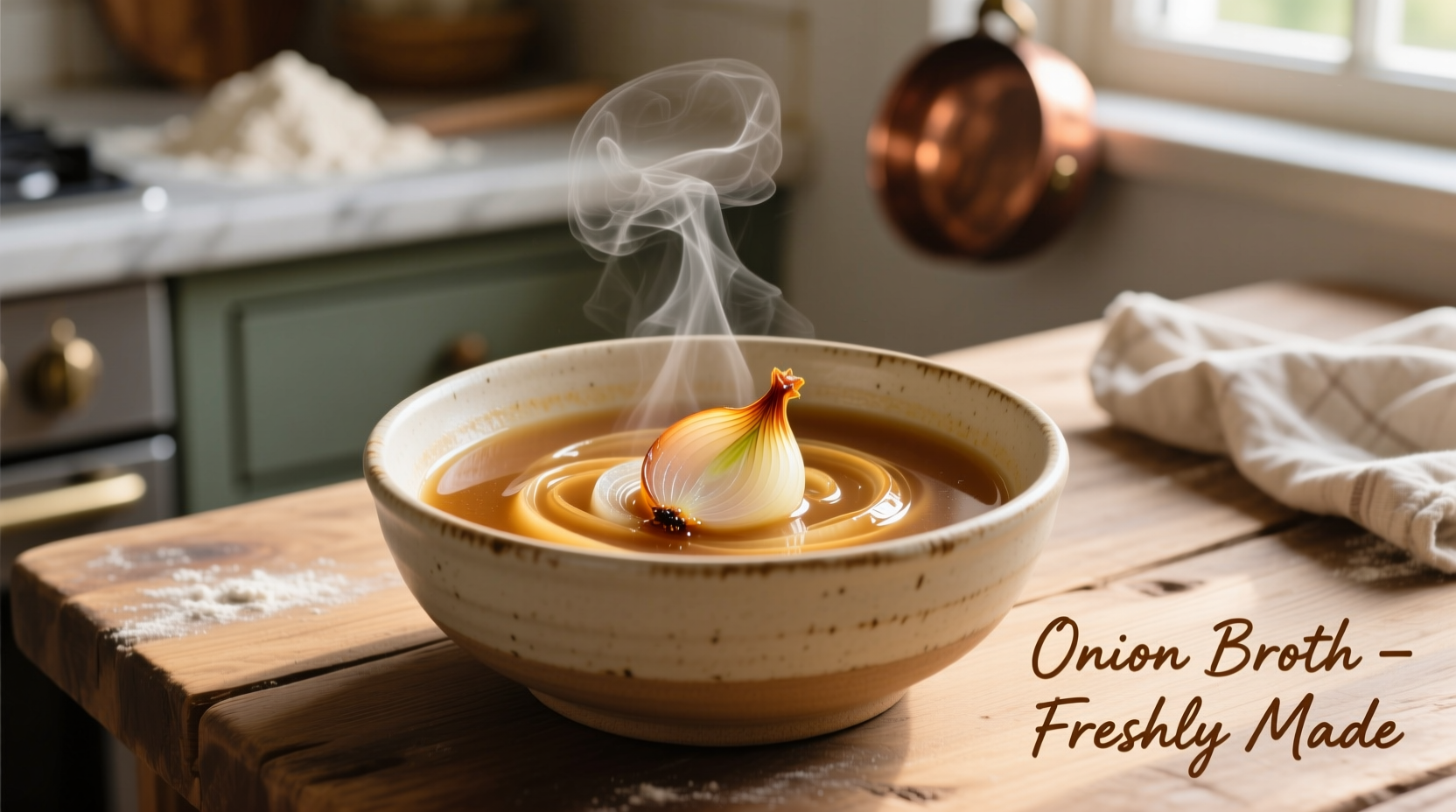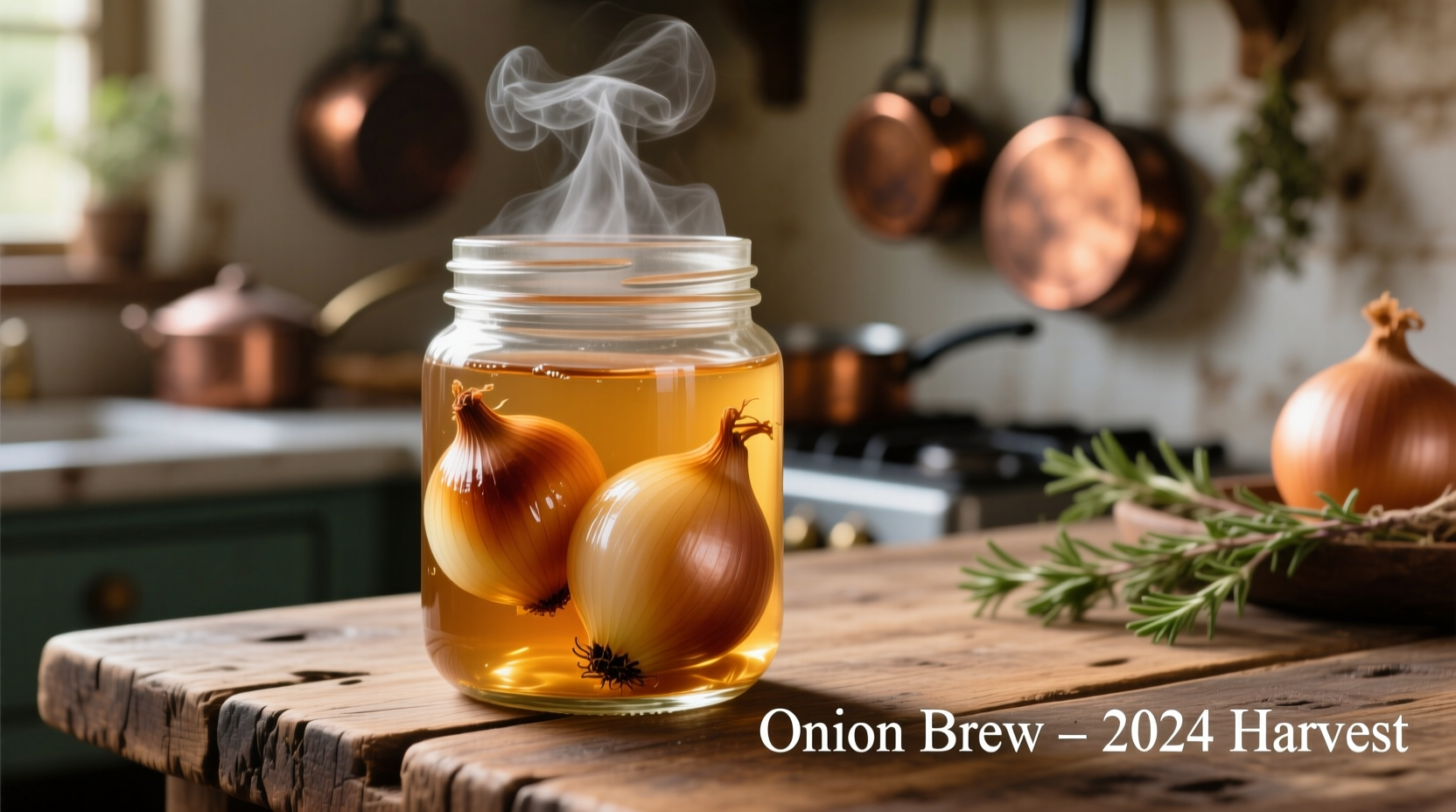When you hear about onion brew, you're likely encountering a centuries-old preparation method that's been passed down through generations. This simple concoction has roots in multiple culinary traditions worldwide, serving both as a flavorful cooking foundation and a gentle home remedy for minor ailments. Understanding what onion brew actually is—and isn't—can help you use it effectively while avoiding common misconceptions.
What Exactly Is Onion Brew?
The term onion brew creates confusion because it's not a standardized preparation. In culinary contexts, it typically means a broth or decoction made by simmering onions in water. In home remedy circles, it often refers to a preparation consumed for minor respiratory comfort.
Historically, cultures across Europe, Asia, and the Americas have utilized onion-based preparations. The ancient Egyptians included onions in medicinal preparations documented in the Ebers Papyrus (c. 1550 BCE), while traditional European folk medicine commonly used onion syrups for respiratory support.
| Preparation Type | Primary Use | Typical Ingredients | Preparation Time |
|---|---|---|---|
| Culinary Onion Broth | Base for soups and sauces | Onions, water, optional herbs | 20-45 minutes |
| Onion Honey Syrup | Home comfort for minor cough | Onions, raw honey | 4-12 hours (no heat) |
| Onion Tea | Gentle warming beverage | Onions, water, optional lemon | 15-30 minutes |
Historical Timeline of Onion Preparations
Onions have been used in liquid preparations for thousands of years:
- c. 3000 BCE: Ancient Egyptians cultivated onions and used them in medicinal preparations
- c. 400 BCE: Hippocrates recommended onion preparations for respiratory ailments
- 16th century: European herbals documented onion syrups for cough relief
- 19th century: Onion preparations appeared in American frontier medicine guides
- Present day: Culinary applications remain widespread while home remedy use continues with appropriate context

Practical Applications in Modern Kitchens
Professional chefs value onion brew primarily as a flavor foundation. When making onion broth for cooking, the slow extraction of natural sugars creates a rich base that enhances soups, stews, and sauces without overpowering other ingredients.
"The key to a quality onion decoction is patience," explains culinary historian Sarah Johnson. "Unlike stock made from bones or vegetables, onion brew requires careful temperature control to prevent bitterness while extracting maximum flavor."
Home Remedy Context with Important Boundaries
Many search for onion tea for cold remedy purposes, but it's crucial to understand the appropriate context:
- Onion preparations may provide gentle comfort for minor, temporary respiratory discomfort
- They do not treat infections or replace medical care for serious conditions
- Children under 1 year should never consume honey-based preparations
- Onion brew is not a substitute for professional medical treatment
The National Center for Complementary and Integrative Health states that while some traditional preparations may offer comfort, they should complement—not replace—evidence-based medical care. For persistent symptoms lasting more than a few days, consult a healthcare provider.
How to Prepare Quality Onion Brew
Whether for culinary or comfort purposes, proper preparation matters. Here's a reliable method for making versatile onion broth:
- Peel and roughly chop 2 large yellow onions (skins can be included for color)
- Place in a saucepan with 4 cups of filtered water
- Bring to a gentle simmer (do not boil vigorously)
- Cover and simmer for 20-30 minutes until onions are tender
- Strain through a fine mesh sieve
- Use immediately or store in refrigerator for up to 5 days
For a comforting beverage, add a squeeze of lemon and a small amount of raw honey (for those over 1 year) after straining. Remember that onion water benefits are primarily related to comfort and flavor, not medical treatment.
Safety and Practical Considerations
When preparing onion-based liquids, keep these important points in mind:
- Never give honey-containing preparations to infants under 1 year due to botulism risk
- Onion brew should complement—not replace—professional medical care for persistent symptoms
- Discard preparations showing signs of spoilage (cloudiness, off odors)
- Store in airtight containers in the refrigerator for no more than 5 days
- Freeze in ice cube trays for longer storage of culinary preparations
While traditional onion preparation methods have cultural significance, they work best as part of a comprehensive approach to wellness that includes proper medical care when needed.
Frequently Asked Questions
What's the difference between onion brew and onion tea?
Onion brew typically refers to a broader category of onion-based preparations, while onion tea specifically describes a beverage made by steeping onions in hot water. Culinary applications usually call it broth, while home remedy contexts often use "tea" or "syrup" depending on preparation method.
Can onion brew help with a cough?
While some find gentle comfort from warm onion preparations for minor, temporary coughs, onion brew is not a medical treatment. The warmth and steam may provide temporary soothing effects similar to other warm beverages. For persistent coughs lasting more than a few days, consult a healthcare provider.
How long does homemade onion broth last?
Properly stored in an airtight container in the refrigerator, homemade onion broth remains fresh for 4-5 days. For longer storage, freeze in ice cube trays then transfer to freezer bags, where it will maintain quality for 2-3 months. Always check for signs of spoilage before using.
Why do some recipes include onion skins in the brew?
Onion skins contain additional flavonoids and pigments that can enhance both color and nutritional profile. When making culinary broth, including skins creates a richer golden color. Always thoroughly wash onions before using skins, and avoid using skins from onions with visible damage or mold.
Is onion syrup as effective as over-the-counter cough medicine?
Research shows that honey-based preparations (which may include onion) can be as effective as some over-the-counter cough medicines for temporary relief in adults and children over 1 year. However, onion syrup alone hasn't been specifically studied. The American Academy of Pediatrics recommends honey for cough relief in children over 1 year, but emphasizes that persistent symptoms require medical evaluation.











 浙公网安备
33010002000092号
浙公网安备
33010002000092号 浙B2-20120091-4
浙B2-20120091-4